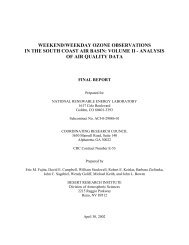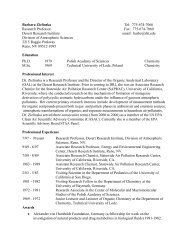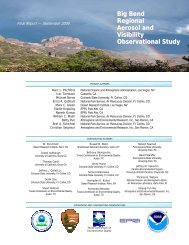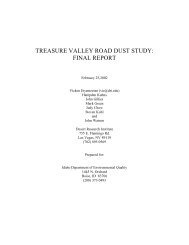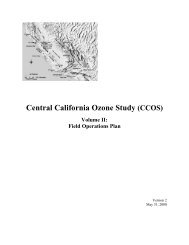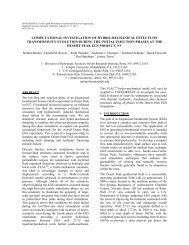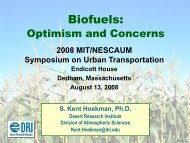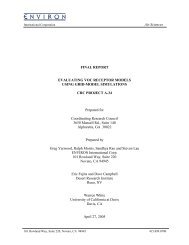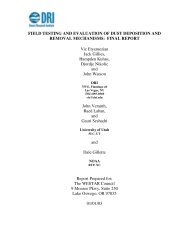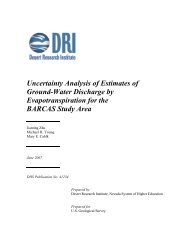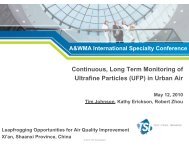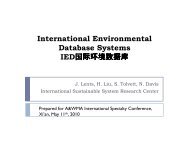Assessment of Conversion Technologies for Bioalcohol Fuel ...
Assessment of Conversion Technologies for Bioalcohol Fuel ...
Assessment of Conversion Technologies for Bioalcohol Fuel ...
Create successful ePaper yourself
Turn your PDF publications into a flip-book with our unique Google optimized e-Paper software.
Technology Characteristics–The Paszner ACOS Process is a hydrolysis process<br />
described as “a unique solvent pulping variant in which the chemistry in the reactor<br />
has been modified in a manner that total (100%) dissolution <strong>of</strong> all biomass<br />
components becomes possible in a single step, achieved by the use <strong>of</strong> a benign<br />
congruent solvent system”. The proprietary solvent chemistry brings about<br />
simultaneous hydrolysis <strong>of</strong> both carbohydrates and lignin and prevents unwanted<br />
byproducts (such as furfurals). 100 percent solvent recycling is said to be achieved,<br />
with no wastewater disposal requirements. No feedstock pre-treatment is required<br />
other than chipping or hammer-milling. The process is intended to be a simple, lowcost,<br />
low-temperature, short reaction time process applicable to any lignocellulosic<br />
feedstocks, including all coniferous and deciduous tree and shrub species and their<br />
barks, agricultural crop residues and grasses, municipal cellulosic solid wastes,<br />
various manures and paper mill sludge. The process is said to be amenable to smallscale<br />
applications.<br />
Development Status–The Paszner ACOS process has been under development <strong>for</strong><br />
28 years, with various bench-scale and pilot-scale testing conducted. This<br />
development work has received limited funding support from Energy Mines and<br />
Resources Canada, a Canadian government agency. This testing is said to have<br />
involved some 35 lignocellulosic species <strong>of</strong> feedstocks. An engineering feasibility<br />
study was completed in 1994. The most recent physical testing phase <strong>of</strong> the process<br />
was apparently completed in 2001, and funding <strong>for</strong> further phases <strong>of</strong> development has<br />
yet to be obtained. Paszner delivered a presentation on its technology at the USDOE<br />
Ethanol Workshop held April 2003 in Sacramento.<br />
Future Development Plans–Paszner <strong>Technologies</strong> has identified and developed<br />
preliminary plans <strong>for</strong> projects applying its plans at numerous sites in Canada, the U.S.,<br />
and various other countries. However, none <strong>of</strong> these projects is known to be moving<br />
<strong>for</strong>ward at this time, with Paszner continuing to pursue funding <strong>for</strong> continued<br />
development <strong>of</strong> its process and to seek potential partners <strong>for</strong> its commercialization.<br />
Petrobras, Rio de Janeiro, Brazil<br />
Organizational Background–Petrobras was <strong>for</strong>med in 1953 when Brazilian<br />
President Vargas signed a law establishing the monopoly <strong>of</strong> the Brazilian federal<br />
government over the activities <strong>of</strong> the oil industry in the country and authorizing the<br />
creation <strong>of</strong> Petróleo Brasileiro S.A. Petrobras as the state company to be the executor<br />
<strong>of</strong> the monopoly. Today Petrobras is the world’s14th largest oil company, and<br />
operates as a semi-public corporation, with activities in at least seven countries<br />
besides Brazil. Petrobras has been instrumental in the development <strong>of</strong> Brazil’s<br />
ethanol fuel program (Proalcool) since its inception in the 1970s. Recently, Petrobras<br />
announced that the company is developing a biomass-to-ethanol process at its<br />
corporate research and development center.<br />
90



